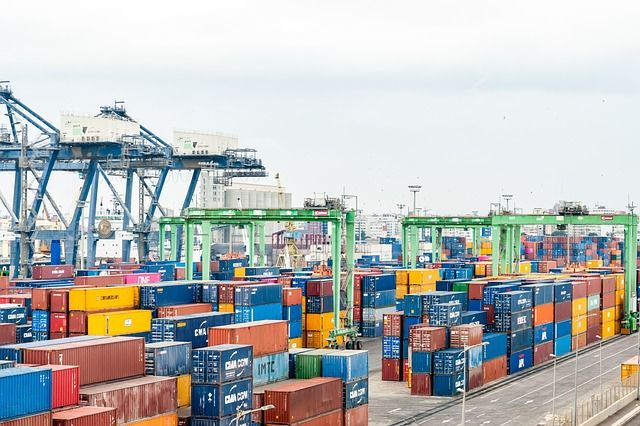How to Start a Logistics Company
Do you want to start a Logistics Company that thrives? Here's a step-by-step guide for how to Start a Logistics Business that is successful and established!
Logistics businesses are in high demand due to the ever-growing complexities of global trade. So if you're looking for an opportunity to start a business with a lot of growth potential, a logistics company may be just what you're looking for. This article will discuss the basics of starting and running a logistics business. We'll also provide tips for getting your business into high gear. So if you're ready to create your own logistics company, read on!
What Is a Logistics Business?

A logistics business is an enterprise specializing in planning, coordinating, and implementing the transportation, storage, and delivery of goods and services. By helping clients improve their supply chain management processes, logistics businesses partner with them to ensure they remain competitive in the marketplace. Logistics companies often employ various strategies, such as optimization algorithms and predictive analytics, to streamline operations while delivering cost-effective solutions.
Furthermore, many logistics businesses rely heavily on digital technologies such as cloud computing, big data analytics, and mobile devices to help automate processes throughout their value chain. From online platforms designed to connect customers with available resources to offering transport capabilities for oversized packages, a logistics business has a wide range of options for providing efficient service at a reasonable cost.
By utilizing modern technology and working closely with suppliers and customers, logistics businesses have become essential to ensuring that shipments are delivered on time and within budget. Through careful planning and strategic use of technology, it's easy to see why this type of business can be advantageous for those looking to get involved in the logistics business industry.
Advantages of Owning a Logistics Business
Owning a logistics business has several distinct advantages that can be advantageous to entrepreneurs.
- First, there is the potential for high profits. Companies in this sector are in exceptionally high demand due to the increased international trade, making it an attractive option for investors who seek to capitalize on the trend.
- Second, logistics companies have limited overhead costs compared with other types of businesses, allowing them to have more control over their finances and allocate operational budgets more efficiently.
- Third, the industry offers many fund sources from banks, venture capitalists, and other public funding options.
- Lastly, a logistics business is less prone to factors that could bring down operations, such as rising oil prices, with demands caused by an economic recession.
Ultimately, entrepreneurs interested in owning their break consider the advantages of setting up a logistics company and ensure they do proper research before investing.
Disadvantages of Owning a Logistics Businesses
Owning a logistics business can be a rewarding experience, but it has its pitfalls.
- One of the most significant drawbacks is the large amount of capital that typically needs to be invested in getting the business up and running. This can include purchasing property vehicles, buying necessary equipment such as pallet jacks and hand carts, and paying for fuel costs.
- Furthermore, logistics businesses are exposed to high levels of risk. This can come in liability claims if an employee causes property damage, shipments arrive late, and incur additional fees or penalties. Entrepreneurs need to understand routes often need to happen on short notice in response to customer demand. Providing quality customer service and satisfying requests within limited time frames can take time and effort.
- Finally, logistical entrepreneurs need to understand regulations regarding vehicle emissions and safety standards when setting up their businesses.
With these potential issues laid out before them, those who choose to pursue a career in logistics should enter into their venture with eyes wide open if they wish to set their business up for success.
How Much Money Will I Need to Start a Logistics Business?
Starting a logistics business can be expensive, especially starting from scratch. You'll likely need at least $100,000 in startup capital to get your business. However, there are ways to reduce these costs. For example, you can partner with other companies or seek funding from investors or banks.
Types of Logistics Companies

There are five main types of logistics companies: freight forwarders, carriers, customs brokers, third-party logistics providers, and logistics consulting firms.
Freight Forwarders
A freight forwarder is a company specializing in transporting and storing goods between locations for its customers. They are an integral part of the supply chain and provide expert advice to their clients. Their services range from selecting carriers and arranging customs clearance to managing special requests like temperature control or coordinating door-to-door shipments. A freight forwarder's unique offering is its ability to deal with multiple facets of logistics, given its vast resource network, which includes exporters, importers, airlines, ocean vessels, truckers, and other service providers.
They can save customers time and money by providing accurate information and expertise on cost-effective shipping methods. Furthermore, they are required to stay up-to-date with the tariff regulations of each country while handling international shipments, which further adds value to their client's overall logistics needs. This makes freight forwarding companies invaluable resources for businesses seeking quality logistics solutions in an increasingly global marketplace.
Carriers
Carriers Logistics Business is a comprehensive logistics service provider specializing in providing business customers with the most cost-effective and reliable way to transport goods. This can be done through various options, such as entire truck transport, containerization, and translating systems. In addition to these services, Carriers Logistics Business provides different data analytics options that enable customers to monitor freight in real time. This ensures quick resolution of any problems and helps businesses keep track of their shipping costs.
The logistics service also offers value-added options, including cargo insurance, route optimization, bulk shipments, tracking information updates, and guarantee setups which help ensure the timely delivery of goods. Overall, Carriers Logistics Business is the ideal choice for businesses looking for an experienced team to handle all aspects of their supply chain operations and achieve cost savings in the long run.
Customs Brokers
A Customs Brokers Logistics Business is a company that specializes in assisting businesses to move goods through international customs. This may include helping clients fill out paperwork, establishing a legal framework for taxing and shipping the goods, and coordinating with government agencies. Additionally, brokers provide expertise in trade laws and regulations to ensure compliance with national and global trade standards. A broker also ensures the safe delivery of cargo by providing guidance on which transportation methods are best suited for each situation. Furthermore, they negotiate with carriers for better rates, resulting in cost savings for their customers.
Customs Brokers Logistics Business operators use their knowledge of different countries' regulations to help expedite procedures and minimize potential delays due to constraints such as quarantine or inspection delays resulting from agricultural commodity shipments or dangerous goods shipments. In addition, by utilizing advanced tracking systems available through some brokers, customers gain additional visibility into the status of their shipment's travel throughout customs clearance processes worldwide.
Effective Customs Brokers Logistics Businesses ultimately serve as an invaluable partners in ensuring businesses have the most efficient pathway to move goods internationally safely and cost-effectively.
Third-Party Logistics Providers
Third-Party Logistics Providers (3PLs) specializes in providing outsourced logistics and supply chain management services. These providers handle various activities, including transportation, warehousing, distribution, and inventory management. By outsourcing these services to 3PLs, businesses can reduce costs while improving customer service and increasing productivity. The advantages of using 3PLs include increased efficiency, cost savings, flexibility, and access to expert knowledge and resources. In addition, 3PLs make it possible for companies to focus on their core competencies, as the 3PL handles all aspects of the logistics business from start to finish.
They offer value-added services such as tracking merchandise movements, preparing custom reporting systems, managing inventories, and handling complex tariff rules, which typically help companies reduce expenses significantly. As the demand for 3PL services continues to grow, businesses increasingly rely on these experts for timely and accurate delivery of products at competitive cost points. In addition, with the help of advanced technology platforms provided by 3PL providers, businesses now have greater control over their supply chains than ever before.
Logistics Consulting Firms
Logistics consulting firms specialize in helping organizations of all sizes improve and optimize their supply chain operations. In particular, these firms provide expert guidance and analysis on a wide range of topics related to supply chains, including inventory management, warehousing, transportation, and logistics. By leveraging their extensive experience and knowledge in the field, they can develop customized solutions that maximize efficiency while reducing costs. Logistics consulting firms also provide critical advice on competitive tenders to ensure organizations get the best possible deal on logistics services.
These consultants are often well-versed in logistics industry trends, so they can provide insights into emerging technologies and strategies for reducing lead times and boosting customer satisfaction. Furthermore, some of these firms offer specialized training programs to help organizations refine their logistical processes for maximum efficiency.
How to Launch Your Logistics Business

Now that you better understand the different types of logistics businesses, it's time to consider how to launch your own.
Determine Your Target Market
The first step in starting a logistics business is determining your target market. Depending on the type of services you plan to offer, your customer base could include businesses that ship goods, freight forwarders, air cargo companies, or even individual consumers. Spend some time researching the needs of these customers and think about what unique services you can provide to fill those needs.
Create a Business Plan
Once you've identified your target market, the next step is creating a business plan. Your business plan should include detailed information on your services, pricing structure, marketing strategies, and operational procedures. This document will serve as a future roadmap for your logistics business and should be written precisely and accurately.
Apply for the Necessary Permits & Licences
Before you can launch your business, you'll need to apply for the necessary permits and licenses. Depending on the type of services you plan to offer, this could include an international freight forwarding license or an air cargo operator certificate. Make sure you fully understand all requirements before submitting any applications.
Choose a Good Name for Your Logistics Business
Your business name is an integral part of your branding strategy. Be sure to choose a name that reflects your services and resonates with customers. In addition, a good name will make it easier for people to remember and recognize your company, so take some time to develop a few creative options.
Secure Funding for Your Logistics Business
Now that you have a business plan, it's time to secure the necessary funding to get your logistics business off the ground. Depending on your needs, consider exploring options such as loans, grants, and investors. It's also essential to obtain any licenses or permits required by law before starting your business.
Create a Branding Strategy
Your branding strategy should be incorporated into your business plan and help you differentiate yourself from competitors. Think about the type of image you want to project, create a logo or tagline, and decide what channels are best for launching your message. Your branding strategy should also include an online presence through social media and a website to help spread the word about your business.
Launch Your Logistics Business
Once you have secured funding, obtained permits and licenses, and developed a strong branding strategy, it's time to launch your logistics business. Start by spreading the word through your social media channels and website. Next, consider advertising in relevant publications or reaching out to potential customers. Finally, track your progress and adjust as needed to ensure you remain successful in the long run.
3 Common Logistic Business Mistakes to Avoid
Starting any business can be challenging, and the logistics industry is no exception. Here are three common mistakes to avoid when launching your logistics business:
Failing to Research Your Target Market
Before you launch your business, make sure you have done enough research into your target market. This will ensure that you are in a position to provide the best possible service to your customers.
Failing to Set Realistic Goals
When starting a logistics business, it can be tempting to set ambitious goals for growth and success. However, failing to set realistic expectations could lead to disappointment and failure. Therefore, consider any risks that may arise while setting up or running your business.
Ignoring Local Regulations
Finally, ensure you are aware of any local regulations related to the logistics industry in your area. This will help ensure that you comply with industry standards and avoid potential fines or penalties.
Conclusion
Starting a logistics business can be a daunting task, but if you take the time to plan and execute properly, you can be successful. By researching your target market, setting realistic goals, and complying with local regulations, you'll be on the right track to success. Also, remember to create a strong branding strategy and launch your business using various marketing channels. With hard work and perseverance, you'll see great results in no time!